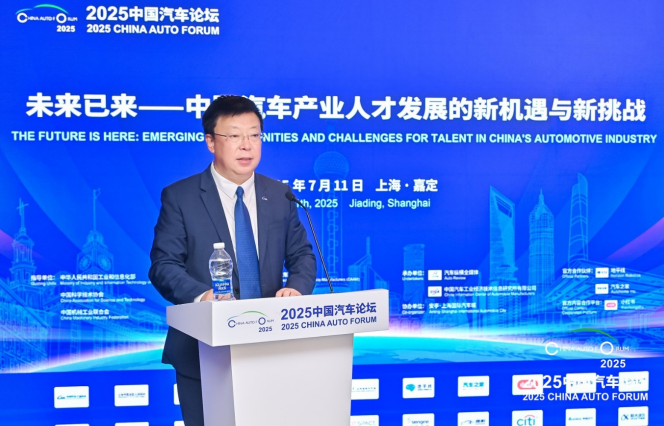From July 10 to 12, the 2025 China Automotive Forum is being held in Jiading, Shanghai. The theme of this year's forum is "Quality Improvement and Innovation, Smart Wins for the Future." During the 'Theme Forum Three: The Future is Here - New Opportunities and Challenges in Talent Development for the Chinese Automotive Industry' held on the afternoon of July 11, Chen Xu, Deputy Secretary-General of the China Association of Automobile Manufacturers, delivered a speech. He stated that talent is the primary resource supporting the high-quality development of the automotive industry. As industry competition deepens, talent is not just a 'support' for development but has become the 'core' that determines victory or defeat.
Currently, the automotive industry is undergoing significant transformation. The acceleration of electrification, intelligence, and green technologies means that cars are evolving from traditional transportation tools into intelligent mobile terminals. Consumer demands for smart experiences and personalized customization in vehicles are rising, while advanced technologies such as industrial internet, big data, and artificial intelligence are deeply integrated into the manufacturing process, driving the transition of automotive manufacturing towards intelligent production with significantly improved efficiency and product quality. The automotive industry is deeply merging with energy, transportation, and information communication sectors, creating a new industry ecosystem.
Chen Xu emphasized the increasing importance of talent in the context of this transformation. With the rapid development of automotive technology, traditional automotive professionals can no longer meet industry demands; there is a pressing need for interdisciplinary talents. For example, professionals who understand automotive engineering and are proficient in artificial intelligence, or those familiar with new energy vehicle technologies and energy management, are in short supply. China's automotive industry is accelerating its shift from being a 'follower' to a global 'leader.' According to the China Association of Automobile Manufacturers, from January to June this year, the production and sales of automobiles reached 15.621 million and 15.653 million units, respectively, marking year-on-year growth of 12.5% and 11.4%. The entire automotive industry operated steadily in the first half of the year. The new energy vehicle sector continues to grow rapidly, with production and sales reaching 6.968 million and 6.937 million units, respectively, showing year-on-year increases of 41.4% and 40.3%. Notably, new energy vehicles accounted for 44.3% of total new vehicle sales.
Furthermore, the market share of Chinese brand passenger cars continues to expand, with sales of 9.27 million units from January to June, up 25% year-on-year, capturing 68.5% market share, over two-thirds, a 6.6 percentage point increase from the same period last year, with nearly 70% market share for domestic brands. Chen Xu emphasized that we have realized the dreams of several generations of automotive professionals, and these achievements reflect the continuous improvement of China's automotive quality, technology, brand, and service levels, as well as a significant enhancement of international competitiveness. Behind these impressive results are breakthroughs in technology, supportive policies, and the wisdom and hard work of countless automotive professionals. However, we have a long way to go and greater responsibilities ahead. Supporting the sustainable and healthy development of the industry from the perspective of talent supply training and maintaining continuous performance growth is an important issue. It can be said that talent is the primary resource supporting the high-quality development of the automotive industry. As industry competition deepens, talent has become the 'core' that determines victory or defeat. The global automotive industry is racing towards electrification, intelligence, and greening, but there is a global shortage of intelligent connected talent, skills are lagging behind technological innovation, and the 'last mile' of industry-university-research collaboration needs to be addressed. Chen Xu believes that these challenges warn us: without the 'lead' of talent, there can be no 'lead' in a sustainable industry.
2025 China Automotive Forum Highlights Talent Development Challenges in the Industry

Share this post on: